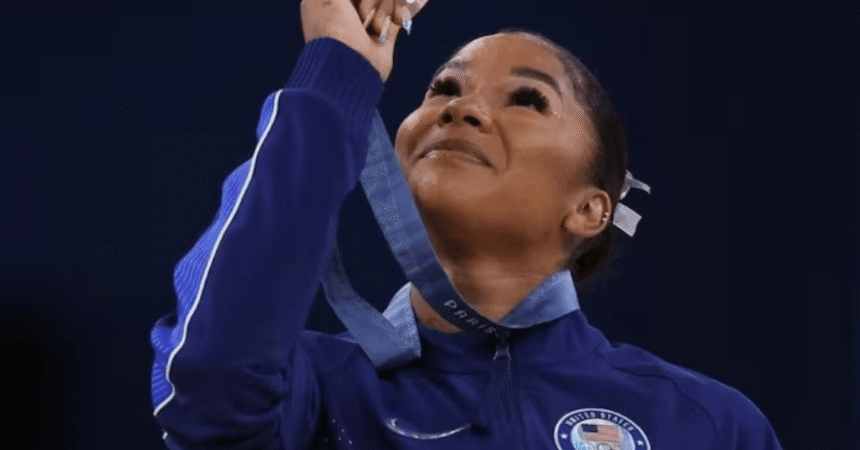In the world of sports, Olympic medals symbolize not just personal achievement, but also national pride and legacy. For U.S. gymnast Jordan Chiles, the journey to reclaim her Olympic bronze medal has turned into a complex legal battle, with potential implications that could reshape how sports disputes are adjudicated in the future. Central to her fight is a piece of video footage captured by a Netflix documentary crew, which could provide the evidence needed to overturn a controversial ruling by the Court of Arbitration for Sport (CAS).
The Context of Jordan Chiles’ Olympic Journey
Jordan Chiles first gained widespread recognition during the Tokyo 2020 Olympics, where she was part of the U.S. women’s gymnastics team that was expected to dominate. However, the Tokyo Games were overshadowed by the mental health struggles of superstar gymnast Simone Biles, who withdrew from several events to prioritize her well-being. Chiles stepped into the spotlight, delivering impressive performances and showcasing her resilience, ultimately earning a bronze medal in the floor exercise.
At the Paris Olympics, Chiles again demonstrated her talent and determination. Her performance in the floor exercise was initially rewarded with a bronze medal. However, this moment of triumph quickly turned sour when a dispute over the scoring process emerged, leading to a ruling that stripped her of the medal.
The Controversial CAS Ruling
The controversy centers on the actions of Chiles’ coach, who inquired about her score following her performance. The CAS ruled that the inquiry was made too late, which effectively disqualified her from retaining the bronze medal. Instead, the medal was awarded to Ana Barbosu of Romania.
This decision sparked outrage among Chiles’ supporters, who argued that the ruling did not reflect the reality of the situation. Chiles and her legal team contended that the coach’s inquiry was, in fact, timely and that the CAS’s decision was flawed. The implications of this ruling were profound; not only was Chiles stripped of her medal, but the decision also raised questions about the integrity of the scoring process and the rights of athletes in similar situations.
The Role of the Netflix Footage
Amidst the turmoil, the Netflix docuseries “Simone Biles Rising” emerged as a potential game-changer. The series, which chronicles the journeys of several elite gymnasts, including Chiles, features footage captured during the critical moments surrounding her performance. This video evidence could serve as crucial support for her appeal.
According to reports, the footage shows Chiles’ coach approaching the judges’ table within the allowed timeframe to voice an objection regarding Chiles’ score. This evidence directly contradicts the CAS ruling, which claimed the inquiry was made too late. By presenting this footage, Chiles’ legal team aims to bolster their argument that her coach acted appropriately and within the rules.
Legal Strategies and Challenges
Chiles’ legal team has taken the fight to the Federal Supreme Court of Switzerland, arguing that the CAS made a significant error by failing to consider the Netflix footage. They assert that this oversight violates Chiles’ “right to be heard,” a fundamental principle in legal proceedings that ensures individuals have the opportunity to present their case fully.
Additionally, there are allegations of a conflict of interest involving the head of the CAS panel that adjudicated Chiles’ case. Such claims could further undermine the credibility of the ruling and add complexity to the appeal process. The combination of procedural errors and potential conflicts of interest presents a strong case for reconsideration.
The Legal Framework
Understanding the legal framework surrounding sports arbitration is essential for grasping the significance of Chiles’ case. The CAS is the highest authority in sports disputes, often referred to as the “Supreme Court of Sport.” It is responsible for adjudicating a wide range of issues, including doping violations, contract disputes, and eligibility challenges.
However, the CAS is not infallible. Its rulings can be challenged in national courts under certain circumstances, particularly if there are questions about due process or procedural fairness. Chiles’ legal team is leveraging this framework to argue that the CAS failed to provide a fair hearing, thereby justifying their appeal to the Swiss court.
Implications of Video Evidence
The introduction of video evidence into sports arbitration is a relatively novel concept, and Chiles’ case could set a precedent for future disputes. Traditionally, sports organizations have relied on official scores, judges’ evaluations, and athlete testimonies. However, the emergence of technology and media documentation has the potential to transform how disputes are resolved.
If the Swiss court accepts the Netflix footage as valid evidence, it could encourage athletes in similar situations to seek video documentation to support their claims. This shift could lead to more transparency in the adjudication process and hold governing bodies accountable for their decisions.
The Broader Impact on Sports Governance
The ramifications of Chiles’ legal battle extend beyond her personal quest for justice. The outcome could influence how sports organizations handle disputes in the future, particularly regarding the role of video evidence. With the increasing use of technology in sports—from instant replay to advanced scoring systems—there is a growing expectation for transparency and fairness in the decision-making process.
Athlete Rights and Advocacy
Chiles’ case also highlights the importance of athlete rights and advocacy within the realm of sports governance. Athletes are often at the mercy of governing bodies and officials, and their ability to challenge decisions can be limited. By standing up against the CAS ruling, Chiles is not only fighting for her own recognition but also advocating for the rights of all athletes to have their voices heard.
The conversation surrounding athlete mental health, fairness in competition, and transparency in scoring is gaining traction. Chiles’ determination to reclaim her medal can inspire other athletes facing similar challenges to pursue justice and demand accountability from governing bodies.
The Role of the Media
The involvement of media, particularly through platforms like Netflix, has changed the landscape of sports storytelling and documentation. The visibility afforded to athletes’ journeys through such media can amplify their struggles and victories, bringing attention to issues that might otherwise go unnoticed.
In Chiles’ case, the Netflix footage serves as a powerful tool in her legal arsenal. It demonstrates how media can play a crucial role in shaping narratives and influencing outcomes in the realm of sports. This trend may lead to increased scrutiny of sports organizations and their decisions, pushing for greater transparency and fairness.
The Emotional Toll of the Battle
Beyond the legal ramifications, the emotional toll on athletes engaged in disputes over their achievements cannot be understated. For Chiles, the experience of fighting for her medal is not just a legal battle; it represents her dedication, hard work, and passion for gymnastics. The pressure to perform at the highest level while dealing with the uncertainty of her Olympic standing can weigh heavily on any athlete.
Chiles has expressed her determination to fight for what she believes is right. This resilience is not only commendable but also indicative of the spirit that drives athletes to excel. The emotional aspects of her journey are intertwined with the broader narrative of sportsmanship, competition, and the pursuit of excellence.
Looking Ahead: The Future of the Appeal
As Chiles’ appeal unfolds in the Swiss court, the gymnastics community, sports enthusiasts, and the general public are keenly observing the developments. The potential outcomes of this case will have significant implications for Chiles personally and for the landscape of sports arbitration as a whole.
Potential Outcomes
- Restoration of the Bronze Medal: If the court rules in favor of Chiles and accepts the Netflix footage as valid evidence, she could reclaim her bronze medal, marking a significant victory for her and her supporters.
- Setting a Precedent: A ruling that recognizes the admissibility of video evidence could pave the way for future athletes to utilize similar materials in disputes, leading to a more transparent and fair process.
- Changes in CAS Procedures: Depending on the outcome, the CAS may be prompted to reevaluate its procedures regarding how disputes are handled, especially concerning the consideration of evidence and the rights of athletes.
- Increased Awareness: Regardless of the outcome, Chiles’ case has already sparked discussions about athlete rights and governance, raising awareness of the issues athletes face within competitive sports.
Conclusion
Jordan Chiles’ pursuit of her Olympic bronze medal is a multifaceted journey that encapsulates the complexities of sports governance, athlete rights, and the role of media in shaping narratives. The potential influence of the Netflix footage on her case cannot be understated; it represents a critical piece of evidence that could redefine the outcome of her appeal.
As the legal battle unfolds, Chiles’ resilience and determination serve as an inspiration for athletes everywhere, reminding them of the importance of standing up for their rights. The implications of this case extend beyond individual recognition, touching upon broader themes of fairness, transparency, and accountability in sports.
In an age where technology and media play an increasingly significant role in our lives, Chiles’ fight may well set a precedent that reshapes the future of sports disputes. As she navigates this challenging journey, the world watches with bated breath, hopeful for a resolution that honors her hard work and dedication to her sport.
#JordanChiles #OlympicBronze #SportsLaw #CAS #AthleteRights #SimoneBilesRising #Gymnastics #LegalBattle #VideoEvidence #SportsGovernance #FairnessInSports







